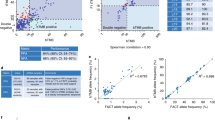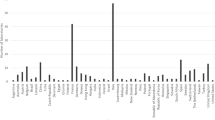Abstract
The European Commision (EC) recently approved osimertinib for the treatment of adult patients with locally advanced or metastatic non-small-cell lung cancer (NSCLC) harboring EGFR T790M mutations. Besides tissue-based testing, blood samples containing cell-free circulating tumor DNA (ctDNA) can be used to interrogate T790M status. Herein, we describe the conditions and results of a round robin trial (RRT) for T790M mutation testing in NSCLC tissue specimens and peripheral blood samples spiked with cell line DNA mimicking tumor-derived ctDNA. The underlying objectives of this two-staged external quality assessment (EQA) approach were (a) to evaluate the accuracy of T790M mutations testing across multiple centers and (b) to investigate if a liquid biopsy-based testing for T790M mutations in spiked blood samples is feasible in routine diagnostic. Based on a successfully completed internal phase I RRT, an open RRT for EGFR T790M mutation testing in tumor tissue and blood samples was initiated. In total, 48 pathology centers participated in the EQA. Of these, 47 (97.9%) centers submitted their analyses within the pre-defined time frame and 44 (tissue), respectively, 40 (plasma) successfully passed the test. The overall success rates in the RRT phase II were 91.7% (tissue) and 83.3% (blood), respectively. Thirty-eight out of 48 participants (79.2%) successfully passed both parts of the RRT. The RRT for blood-based EGFR testing initiated in Germany is, to the best of our knowledge, the first of his kind in Europe. In summary, our results demonstrate that blood-based genotyping for EGFR resistance mutations can be successfully integrated in routine molecular diagnostics complementing the array of molecular methods already available at pathology centers in Germany.




Similar content being viewed by others
References
Siegel R, Naishadham D, Jemal A (2013) Cancer statistics, 2013. CA Cancer J Clin 63:11–30
Lynch TJ, Bell DW, Sordella R et al (2004) Activating mutations in the epidermal growth factor receptor underlying responsiveness of non-small-cell lung cancer to gefitinib. N Engl J Med 350:2129–2139
Paez JG, Janne PA, Lee JC et al (2004) EGFR mutations in lung cancer: correlation with clinical response to gefitinib therapy. Science (New York, NY) 304:1497–1500
Ellison G, Zhu G, Moulis A, Dearden S, Speake G, McCormack R (2013) EGFR mutation testing in lung cancer: a review of available methods and their use for analysis of tumour tissue and cytology samples. J Clin Pathol 66:79–89
Szumera-Cieckiewicz A, Olszewski WT, Tysarowski A et al (2013) EGFR mutation testing on cytological and histological samples in non-small cell lung cancer: a Polish, single institution study and systematic review of European incidence. Int J Clin Exp Pathol 6:2800–2812
Pao W, Miller V, Zakowski M et al (2004) EGF receptor gene mutations are common in lung cancers from “never smokers” and are associated with sensitivity of tumors to gefitinib and erlotinib. Proc Natl Acad Sci U S A 101:13306–13311
Choughule A, Noronha V, Joshi A et al (2013) Epidermal growth factor receptor mutation subtypes and geographical distribution among Indian non-small cell lung cancer patients. Indian J Cancer 50:107–111
Mitsudomi T, Morita S, Yatabe Y et al (2010) Gefitinib versus cisplatin plus docetaxel in patients with non-small-cell lung cancer harbouring mutations of the epidermal growth factor receptor (WJTOG3405): an open label, randomised phase 3 trial. Lancet Oncol 11:121–128
Park K, Tan EH, O'Byrne K et al (2016) Afatinib versus gefitinib as first-line treatment of patients with EGFR mutation-positive non-small-cell lung cancer (LUX-Lung 7): a phase 2B, open-label, randomised controlled trial. Lancet Oncol 17:577–589
D'Angelo SP, Pietanza MC, Johnson ML et al (2011) Incidence of EGFR exon 19 deletions and L858R in tumor specimens from men and cigarette smokers with lung adenocarcinomas. J Clin Oncol 29:2066–2070
Mok TS, Wu YL, Thongprasert S et al (2009) Gefitinib or carboplatin-paclitaxel in pulmonary adenocarcinoma. N Engl J Med 361:947–957
Fenizia F, De Luca A, Pasquale R et al (2015) EGFR mutations in lung cancer: from tissue testing to liquid biopsy. Future Oncol (London, England) 11:1611–1623
Chouaid C, Dujon C, Do P et al (2014) Feasibility and clinical impact of re-biopsy in advanced non small-cell lung cancer: a prospective multicenter study in a real-world setting (GFPC study 12–01). Lung Cancer (Amsterdam, Netherlands) 86:170–173
Mellert H, Foreman T, Jackson L et al (2017) Development and clinical utility of a blood-based test service for the rapid identification of actionable mutations in non-small cell lung carcinoma. J Mol Diagn 19:404–416
Ionescu DN (2013) Impact of the College of American Pathologists, the International Association for the Study of Lung Cancer, and the Association for Molecular Pathology clinical practice guidelines for EGFR and ALK testing in lung cancer in Canada. Curr Oncol (Toronto, Ont) 20:220–226
Oxnard GR, Thress KS, Alden RS et al (2016) Association between plasma genotyping and outcomes of treatment with osimertinib (AZD9291) in advanced non-small-cell lung cancer. J Clin Oncol 34:3375–3382
Zhou C, Wu YL, Chen G et al (2011) Erlotinib versus chemotherapy as first-line treatment for patients with advanced EGFR mutation-positive non-small-cell lung cancer (OPTIMAL, CTONG-0802): a multicentre, open-label, randomised, phase 3 study. Lancet Oncol 12:735–742
Sequist LV, Waltman BA, Dias-Santagata D et al (2011) Genotypic and histological evolution of lung cancers acquiring resistance to EGFR inhibitors. Sci Transl Med 3:75ra26
Kobayashi S, Boggon TJ, Dayaram T et al (2005) EGFR mutation and resistance of non-small-cell lung cancer to gefitinib. N Engl J Med 352:786–792
Pao W, Miller VA, Politi KA et al (2005) Acquired resistance of lung adenocarcinomas to gefitinib or erlotinib is associated with a second mutation in the EGFR kinase domain. PLoS Med 2:e73
Yu HA, Arcila ME, Rekhtman N et al (2013) Analysis of tumor specimens at the time of acquired resistance to EGFR-TKI therapy in 155 patients with EGFR-mutant lung cancers. Clin Cancer Res 19:2240–2247
Balak MN, Gong Y, Riely GJ et al (2006) Novel D761Y and common secondary T790M mutations in epidermal growth factor receptor-mutant lung adenocarcinomas with acquired resistance to kinase inhibitors. Clin Cancer Res 12:6494–6501
FDA (2016) Osimertinib Journal. https://www.fda.gov/drugs/informationondrugs/approveddrugs/ucm549683.htm
EMA (2016) Osimertinib. Journal. http://www.ema.europa.eu/ema/index.jsp?curl=pages/medicines/human/medicines/004124/human_med_001961.jsp&mid=WC0b01ac058001d124
Cross DA, Ashton SE, Ghiorghiu S et al (2014) AZD9291, an irreversible EGFR TKI, overcomes T790M-mediated resistance to EGFR inhibitors in lung cancer. Cancer Discov 4:1046–1061
Janne PA, Yang JC, Kim DW et al (2015) AZD9291 in EGFR inhibitor-resistant non-small-cell lung cancer. N Engl J Med 372:1689–1699
Ramalingam S, Yang JC, Lee CK et al (2016) LBA1_PR: osimertinib as first-line treatment for EGFR mutation-positive advanced NSCLC: updated efficacy and safety results from two phase I expansion cohorts. J Thorac Oncol 11:S152
Kurman RJCM, Herrington CS, Young RH (2014) WHO classification of tumours, Volume 6, WHO Press ISBN-13 9789283224358
Travis WD, Brambilla E, Nicholson AG et al (2015) The 2015 World Health Organization classification of lung tumors: impact of genetic, clinical and radiologic advances since the 2004 classification. J Thorac Oncol 10:1243–1260
Heydt C, Fassunke J, Kunstlinger H et al (2014) Comparison of pre-analytical FFPE sample preparation methods and their impact on massively parallel sequencing in routine diagnostics. PLoS One 9:e104566
Konig K, Peifer M, Fassunke J et al (2015) Implementation of amplicon parallel sequencing leads to improvement of diagnosis and therapy of lung cancer patients. J Thorac Oncol 10:1049–1057
Landi L, Cappuzzo F (2014) Pharmacotherapy targeting the EGFR oncogene in NSCLC. Expert Opin Pharmacother 15:2293–2305
Gil-Bazo I, Rolfo C (2016) AZD9291 in TKI EGFR resistance in non-small cell lung cancer and the new concept of phase I trials. Transl Lung Cancer Res 5:85–88
Stewart EL, Tan SZ, Liu G, Tsao MS (2015) Known and putative mechanisms of resistance to EGFR targeted therapies in NSCLC patients with EGFR mutations—a review. Transl Lung Cancer Res 4:67–81
Sun W, Yuan X, Tian Y et al (2015) Non-invasive approaches to monitor EGFR-TKI treatment in non-small-cell lung cancer. J Hematol Oncol 8:95
Mack PC, Holland WS, Burich RA et al (2009) EGFR mutations detected in plasma are associated with patient outcomes in erlotinib plus docetaxel-treated non-small cell lung cancer. J Thorac Oncol 4:1466–1472
Tsang JC, Lo YM (2007) Circulating nucleic acids in plasma/serum. Pathology 39:197–207
Murtaza M, Dawson SJ, Tsui DW et al (2013) Non-invasive analysis of acquired resistance to cancer therapy by sequencing of plasma DNA. Nature 497:108–112
Sholl LM, Aisner DL, Allen TC et al (2016) Liquid biopsy in lung cancer: a perspective from members of the pulmonary pathology society. Arch Pathol Lab Med 140:825–829
Yanagita M, Redig AJ, Paweletz CP et al (2016) A prospective evaluation of circulating tumor cells and cell-free DNA in EGFR-mutant non-small cell lung cancer patients treated with erlotinib on a phase II trial. Clin Cancer Res 22:6010–6020
Lindeman NI, Cagle PT, Beasley MB et al (2013) Molecular testing guideline for selection of lung cancer patients for EGFR and ALK tyrosine kinase inhibitors: guideline from the College of American Pathologists, International Association for the Study of Lung Cancer, and Association for Molecular Pathology. Arch Pathol Lab Med 137:828–860
Naidoo J M, Drilon A (2014) Molecular diagnostic testing in non-small cell lung cancer. Am J Hematol Oncol. Available on http://www.gotoper.com/publications/ajho/2014/2014sep/molecular-diagnostic-testing-in-non-small-cell-lung-cancer. Last accessed October 20, 2016
Reck M, Hagiwara K, Han B et al (2016) ctDNA determination of EGFR mutation status in European and Japanese patients with advanced NSCLC: the ASSESS study. J Thorac Oncol 11:1682–1689
Zhang XC, Zhang J, Li M et al (2013) Establishment of patient-derived non-small cell lung cancer xenograft models with genetic aberrations within EGFR, KRAS and FGFR1: useful tools for preclinical studies of targeted therapies. J Transl Med 11:168
Funding
Phase I (internal round robin trial) of this study was funded by AstraZeneca.
Author information
Authors and Affiliations
Corresponding author
Ethics declarations
Conflict of interest
Author JF has received speaker honoraria from AstraZeneca and Roche. Author AS has received speaker honoraria from AstraZeneca and is a member of the Diagnostic Content advisory board of AstraZeneca. VE received speaker honoraria from AstraZeneca and is a advisory board members of Astra Zeneca. Author AJ has received speaker honoraria from Amgen, AstraZeneca, Merck-Serono, Roche Pharmaceuticals and is a member of committee (advisory board): Amgen, AstraZeneca, Biocartis, Merck-Serono, Novartis. Author UL has received speaker honoraria from AstraZeneca and Roche. Author HK has received honorarium from Astra Zeneca as an advisory board member. Author PS received speaker honoraria from Astra Zeneca and is an advisory board member of AstraZeneca. Author TK has received speaker honoraria from Merck and AstraZeneca, is a member of AdBoard (Consulting): Amgen, AstraZeneca, Merck KGaA, MSD, Novartis, Pfizer, Roche and has received research grants from Merck and Roche. Author RB has received speaker honoraria from AstraZeneca, Boehringer Ingelheim, BMS, MSD, Pfizer, Qiagen and RocheVentana, has served in Scientific Advisory Boards from AstraZeneca, Boehringer Ingelheim, BMS, MSD, Pfizer, Qiagen and RocheVentana, and is a Cofounder and Chief Scientific Officer of Targos Molecular Pathology, Kassel, Germany. Author SMB has received speaker honoraria from AstraZeneca, Bristol Myers Squibb, Roche and Novartis and has received research grants from Astra Zeneca and Novartis. MI, DL, MH, CV, AL, RP, AV, SZ, GB, and MD declare that they have no conflict of interest.
Informed consent
The samples were collected with informed consent and under approved local ethical protocols from each patient.
Additional information
Virchows Archiv conforms to the ICMJE recommendation for qualification of authorship. The ICMJE recommends that authorship be based on the following 4 criteria:
• Substantial contributions to the conception or design of the work; or the acquisition, analysis, or interpretation of data for the work; AND
• Drafting the work or revising it critically for important intellectual content; AND
• Final approval of the version to be published; AND
• Agreement to be accountable for all aspects of the work in ensuring that questions related to the accuracy or integrity of any part of the work are appropriately investigated and resolved.
This article is part of the Topical Collection on Quality in Pathology
Electronic supplementary material
Supplementary Table 1
(DOCX 13 kb)
Rights and permissions
About this article
Cite this article
Fassunke, J., Ihle, M.A., Lenze, D. et al. EGFR T790M mutation testing of non-small cell lung cancer tissue and blood samples artificially spiked with circulating cell-free tumor DNA: results of a round robin trial. Virchows Arch 471, 509–520 (2017). https://doi.org/10.1007/s00428-017-2226-8
Received:
Revised:
Accepted:
Published:
Issue Date:
DOI: https://doi.org/10.1007/s00428-017-2226-8




